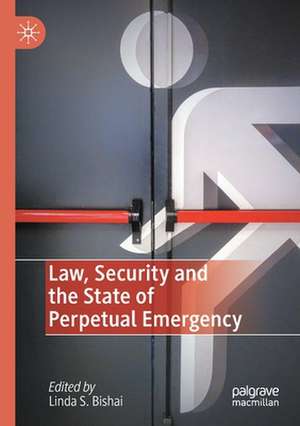Law, Security and the State of Perpetual Emergency
Editat de Linda S. Bishaien Limba Engleză Paperback – 26 iun 2021
| Toate formatele și edițiile | Preț | Express |
|---|---|---|
| Paperback (1) | 639.41 lei 43-57 zile | |
| Springer International Publishing – 26 iun 2021 | 639.41 lei 43-57 zile | |
| Hardback (1) | 643.48 lei 43-57 zile | |
| Springer International Publishing – 26 iun 2020 | 643.48 lei 43-57 zile |
Preț: 639.41 lei
Preț vechi: 752.24 lei
-15% Nou
Puncte Express: 959
Preț estimativ în valută:
122.35€ • 128.09$ • 101.24£
122.35€ • 128.09$ • 101.24£
Carte tipărită la comandă
Livrare economică 07-21 aprilie
Preluare comenzi: 021 569.72.76
Specificații
ISBN-13: 9783030449612
ISBN-10: 3030449610
Pagini: 273
Ilustrații: XXII, 273 p. 3 illus., 2 illus. in color.
Dimensiuni: 148 x 210 mm
Greutate: 0.39 kg
Ediția:1st ed. 2020
Editura: Springer International Publishing
Colecția Palgrave Macmillan
Locul publicării:Cham, Switzerland
ISBN-10: 3030449610
Pagini: 273
Ilustrații: XXII, 273 p. 3 illus., 2 illus. in color.
Dimensiuni: 148 x 210 mm
Greutate: 0.39 kg
Ediția:1st ed. 2020
Editura: Springer International Publishing
Colecția Palgrave Macmillan
Locul publicării:Cham, Switzerland
Cuprins
Ch 1: Introduction.- Ch 2: Law, Security and the State of Perpetual Emergency.- .- Ch 3: Drone Warfare and the Emergence of Exceptional Space.- Ch 4: 'Lawfare' and Counterterrorism under Democratic and Authoritarian Regimes.- Ch 5: Lowing the bar: the fragility of the 'rehabilitative ideal' in the penal responses to terrorism crimes.- Ch 6: Unintended Consequences of Swedish Asylum Procedures: National Security Implications of Refugees Stuck in Legal Limbo.- Ch 7: 'Extremely loud and incredibly close': Criminal Terrorism and Exceptional Legislation in Italy.- Ch 8: Anti-terrorism as Neo-Colonialism.- Ch 9: Institutionalizing Irregularities: Terrorism prosecutions in the specialized 'court' of Saudi Arabia.- Ch 10: The heavy cost of a state of emergency on policing.- Ch 11: Sovereign and Belligerent Powers .- Ch 12: Conclusion.
Notă biografică
Linda Bishai teaches international law and the use of force as an Adjunct Professor at the George Washington University, USA. In addition to research on international law issues, she has focused on countering violent extremism and security sector reform.
Textul de pe ultima copertă
Presenting diverse contributors from legal, academic, and practitioner sectors, this book illustrates how the distinctions between international and domestic law are falling away in the context of security, particularly in the responses to terrorism, and explores the implications of these dramatic shifts in the normative order. Fundamental changes in the powers of the state and the rights of populations have accelerated since the globalized response to 9/11, creating effects that spread beyond borders and operate in a new, as yet under-conceptualized space. Although these altered practices were said to be in response to exceptional circumstances — a response to terrorism — they have become increasingly established in an altered baseline norm. This book explores the (inter)national implications of exceptional legal efforts to protect states’ domestic space in the realm of security.
Linda Bishai teaches international law and the use of force as an Adjunct Professor at the George Washington University, USA. In addition to research on international law issues, she has focused on countering violent extremism and security sector reform.
Linda Bishai teaches international law and the use of force as an Adjunct Professor at the George Washington University, USA. In addition to research on international law issues, she has focused on countering violent extremism and security sector reform.
Caracteristici
Illustrates how the distinctions between international and domestic law are falling away in the context of security Explores the impacts of this dramatic shift in the normative order Details the (inter)national implications of exceptional legal efforts to protect states’ domestic space in the context of security
